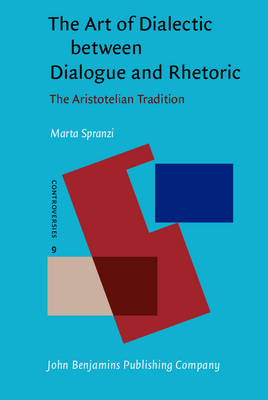
The Art of Dialectic between Dialogue and Rhetoric
The Aristotelian Tradition
Seiten
2011
John Benjamins Publishing Co (Verlag)
978-90-272-1889-6 (ISBN)
John Benjamins Publishing Co (Verlag)
978-90-272-1889-6 (ISBN)
Reconstructs the tradition of dialectic from Aristotle's "Topics", its founding text, up to its 'renaissance' in 16th century Italy, and focuses on the role of dialectic in the production of knowledge.
This book reconstructs the tradition of dialectic from Aristotle's Topics, its founding text, up to its "renaissance" in 16th century Italy, and focuses on the role of dialectic in the production of knowledge. Aristotle defines dialectic as a structured exchange of questions and answers and thus links it to dialogue and disputation, while Cicero develops a mildly skeptical version of dialectic, identifies it with reasoning in utramque partem and connects it closely to rhetoric. These two interpretations constitute the backbone of the living tradition of dialectic and are variously developed in the Renaissance against the Medieval background. The book scrutinizes three separate contexts in which these developments occur:
Rudolph Agricola's attempt to develop a new dialectic in close connection with rhetoric, Agostino Nifo's thoroughly Aristotelian approach and its use of the newly translated commentaries of Alexander of Aphrodisias and Averroes, and Carlo Sigonio's literary theory of the dialogue form, which is centered around Aristotle's Topics.
Today, Aristotelian dialectic enjoys a new life within argumentation theory: the final chapter of the book briefly revisits these contemporary developments and draws some general epistemological conclusions linking the tradition of dialectic to a fallibilist view of knowledge.
This book reconstructs the tradition of dialectic from Aristotle's Topics, its founding text, up to its "renaissance" in 16th century Italy, and focuses on the role of dialectic in the production of knowledge. Aristotle defines dialectic as a structured exchange of questions and answers and thus links it to dialogue and disputation, while Cicero develops a mildly skeptical version of dialectic, identifies it with reasoning in utramque partem and connects it closely to rhetoric. These two interpretations constitute the backbone of the living tradition of dialectic and are variously developed in the Renaissance against the Medieval background. The book scrutinizes three separate contexts in which these developments occur:
Rudolph Agricola's attempt to develop a new dialectic in close connection with rhetoric, Agostino Nifo's thoroughly Aristotelian approach and its use of the newly translated commentaries of Alexander of Aphrodisias and Averroes, and Carlo Sigonio's literary theory of the dialogue form, which is centered around Aristotle's Topics.
Today, Aristotelian dialectic enjoys a new life within argumentation theory: the final chapter of the book briefly revisits these contemporary developments and draws some general epistemological conclusions linking the tradition of dialectic to a fallibilist view of knowledge.
1. Acknowledgements; 2. Introduction: Dialectic and the notion of tradition; 3. 1. Aristotle and the art of dialectic; 4. 2. Dialectic in the Latin world: Cicero, Boethius and the scholastics; 5. 3. The revival of dialectic in the Renaissance: An introduction; 6. 4. The new humanist dialectic and rhetoric: Rudolph Agricola on invention and probability; 7. 5. The Topics and Renaissance Aristotelianism: Agostino Nifo's commentary and his sources; 8. 6. Dialectic and dialogue: Carlo Sigonio and the "road to truth"; 9. 7. Rhetoric, dialectic and epistemology in contemporary argumentation theory; 10. Conclusion: The epistemological value of Aristotelian dialectic; 11. Endnotes; 12. References; 13. Index; 14. Name index; 15. Subject index
| Reihe/Serie | Controversies ; 9 |
|---|---|
| Verlagsort | Amsterdam |
| Sprache | englisch |
| Maße | 164 x 245 mm |
| Gewicht | 610 g |
| Themenwelt | Geisteswissenschaften ► Philosophie ► Logik |
| Geisteswissenschaften ► Sprach- / Literaturwissenschaft ► Sprachwissenschaft | |
| ISBN-10 | 90-272-1889-7 / 9027218897 |
| ISBN-13 | 978-90-272-1889-6 / 9789027218896 |
| Zustand | Neuware |
| Informationen gemäß Produktsicherheitsverordnung (GPSR) | |
| Haben Sie eine Frage zum Produkt? |
Mehr entdecken
aus dem Bereich
aus dem Bereich
ein Gegenentwurf zum kurzfristigen Denken : so werden wir zu den …
Buch | Hardcover (2023)
REDLINE (Verlag)
CHF 27,90
Buch | Softcover (2023)
De Gruyter (Verlag)
CHF 34,90


